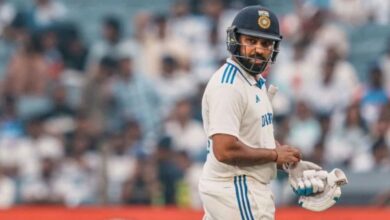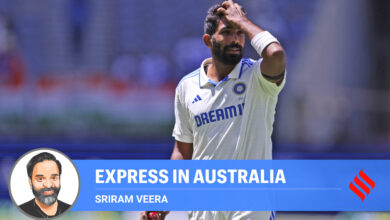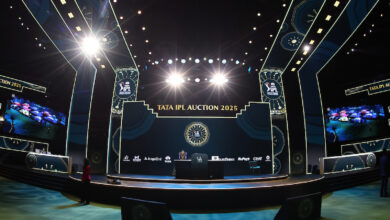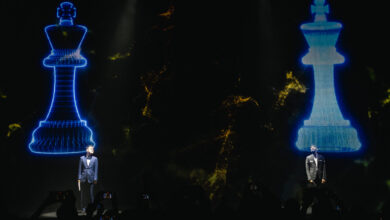Bhambri and Myneni switch to doubles as India pivot in hope to regain Leander-Mahesh glory years

Turns of calendars at New Years and birthdays, typically, bring along almighty decisions for tennis players. Arjun Kadhe was very aware of the years ticking away, when he turned 28. His static singles playing career combined with the pandemic-time stoppage, firmed up his resolution to switch to doubles for good.
“I would’ve given myself two more years in singles but then Corona happened. I’m 28 and I didn’t want to be thinking at 30 that I wish I’d shifted to doubles earlier. Instead this gives me a shot at playing Grand Slams at 30. Corona helped in the decision. I didn’t want to be playing Futures, and Challengers. Wanted to be on the Tour and take a shot at Slams,” Khade said on the sidelines of the announcement of “Doubles Dream of India”.
India’s top names in singles, Saketh Myneni and Yuki Bhambri, whose injury-ravaged career is at crossroads, will also test waters in focussing on doubles for the next six months, hoping to move up the rankings.
A two week special doubles camp took place in Dubai in the fortnight before Chrmas camp; it was headed renowned doubles special coach Jeff Coetzee from South Africa who trained former World Number 1 pair of Cabal and Farah of Colombia for 6 years and helped them win Wimbledon along with a team of assant coach M. Balchandra from India and three physios/trainers from India.
Having spoken to the players quizzing them on their requirements, physics and special coaching, a plan to travel for 25-30 weeks with the group of 10 Indians has been chalked, along the lines of Italy, Russia, UK and Canadian teams who travel in packs. The initiative Rohan Bopanna and funded a Pune-based tech group since March 2022, will look to prop up performances of India’s 10 players currently ranked in the Top 200.Besides Yuki and Saketh, Divij Sharan, Purav Raja, Jeevan N, Sriram Balaji, Ramkumar Ramanathan and Arjun Kadhe will have access to the support.
Physios like Federico Williams and Hernan Faco from Argentina from the Kine Institute in the USA helped out when the Indians played in Mexico. Coach Jonathan Murray, a former Wimbledon Doubles champion himself and physio Francessa Ocampo Valero of Columbia travelled for two weeks with Sriram Balaji and Jeevan Neduncheziyan. Typically, tournament physios allot only 15 minutes to doubles players.
Coaches and physios were sent to Europe, USA and South America from April to November across various Challengers played in those regions – something unheard of in Indian tennis at that level.
While some might view this mass-shift of focus to doubles as a cop out from singles, players ins it’s a pragmatic approach. “If we check, hardly 6-7 players could make headway in singles in the last few years, but at least 10-15 have had breakthroughs in doubles. So Yuki and I decided to try doubles. We’ll give it a shot, make a switch, keep improving as a team and are close to Top 100 this year,” Saketh said.
After years of touring alone, playing doubles is also a spot of comfort. “It’s good to know you are not fighting all alone, you have a friend, you can bounce off ideas. It gets tough on the circuit, but in doubles you have shared experiences. He coaches me, and I coach him,” Saketh added.
Mandar Tamhane who trained alongside Bopanna in their early years in Pune and won junior nationals and stopped tennis after an injury at 22, is helping put together the program. “Lee and Hesh was a glorious period for India but we didn’t capitalise on that advantage, despite having genuine potential,” he said. “The Olympic doubles medal we missed in 2004 – we hope we can win that going forward,” the chief funder Kishor Patil, said.
Kadhe reckons the mere access to a special coach has improved his doubles game several notches. “It’s about positioning, and certain plays which rely on angles. Doubles has short points, and needs a third person to lay out clarity in execution,” he said. “Doubles is serve and volley, straight battle with the guy across the net and working the angles.”
A programme for women’s doubles too will take off soon.
Kadhe reckons doubles could take off as a career option. “Earlier doubles was a last recourse if you couldn’t crack singles,” he said. Bopanna who started out in a promising singles career and made the switch at critical time, stressed it wouldn’t deplete the singles. “At the end of the day it’s the same sport you started playing. Apart from Rajeev Ram, noone of Indian origin is playing the Masters or Slams. Lee Mahesh have been a backbone of that one Davis Cup point for years. It’ll help if we get pairings that can once again ensure that one point.”
The crux of the need for support also was how tennis has been left to fend for itself, while demanding medals from it without funding them through the year, prompting a private entity to chip in. “I am Top 20, but noone helped me with coach and physio, to be in a position to win Slams, except Asian Games, Olympics and Davis Cup,” Bopanna said.







